Business Law Assignment: Contract Law, Case Analysis and Issues
VerifiedAdded on 2020/12/09
|8
|1720
|422
Homework Assignment
AI Summary
This document presents a comprehensive solution to a business law assignment, addressing various aspects of contract law. It begins with an analysis of the Ermogenous v Greek Orthodox Community case, discussing its implications for future decisions involving religious ministers and monetary compensation. The assignment then delves into the enforceability of documents and the impact of arbitration clauses. Further, the solution examines the elements of a valid contract, including offer, acceptance, consideration, and legal intent, applying these principles to scenarios involving undue influence and promises between family members. It explores the application of exception clauses in contracts, such as parking tickets, and determines whether they create binding agreements. The assignment also examines the distinction between representations and contract terms, using the Dick Bentley Productions v Harold Smith Motors case as an example. Finally, it analyzes the Goods Act, 1958 (Vic), particularly sections 6 and 12, to determine if a party can take action against a company for breach of contract. The solution concludes with a detailed reference list of sources utilized.
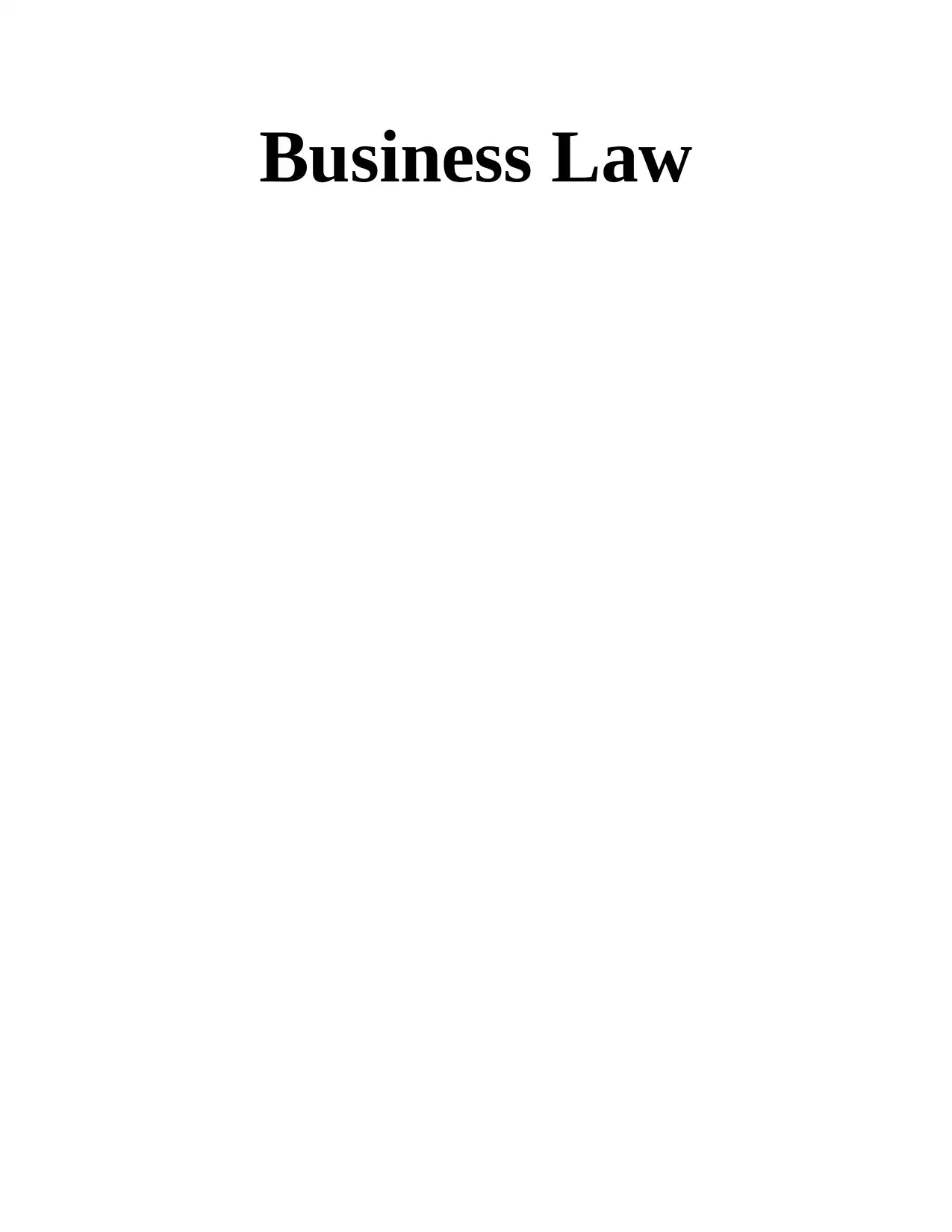
Business Law
Paraphrase This Document
Need a fresh take? Get an instant paraphrase of this document with our AI Paraphraser
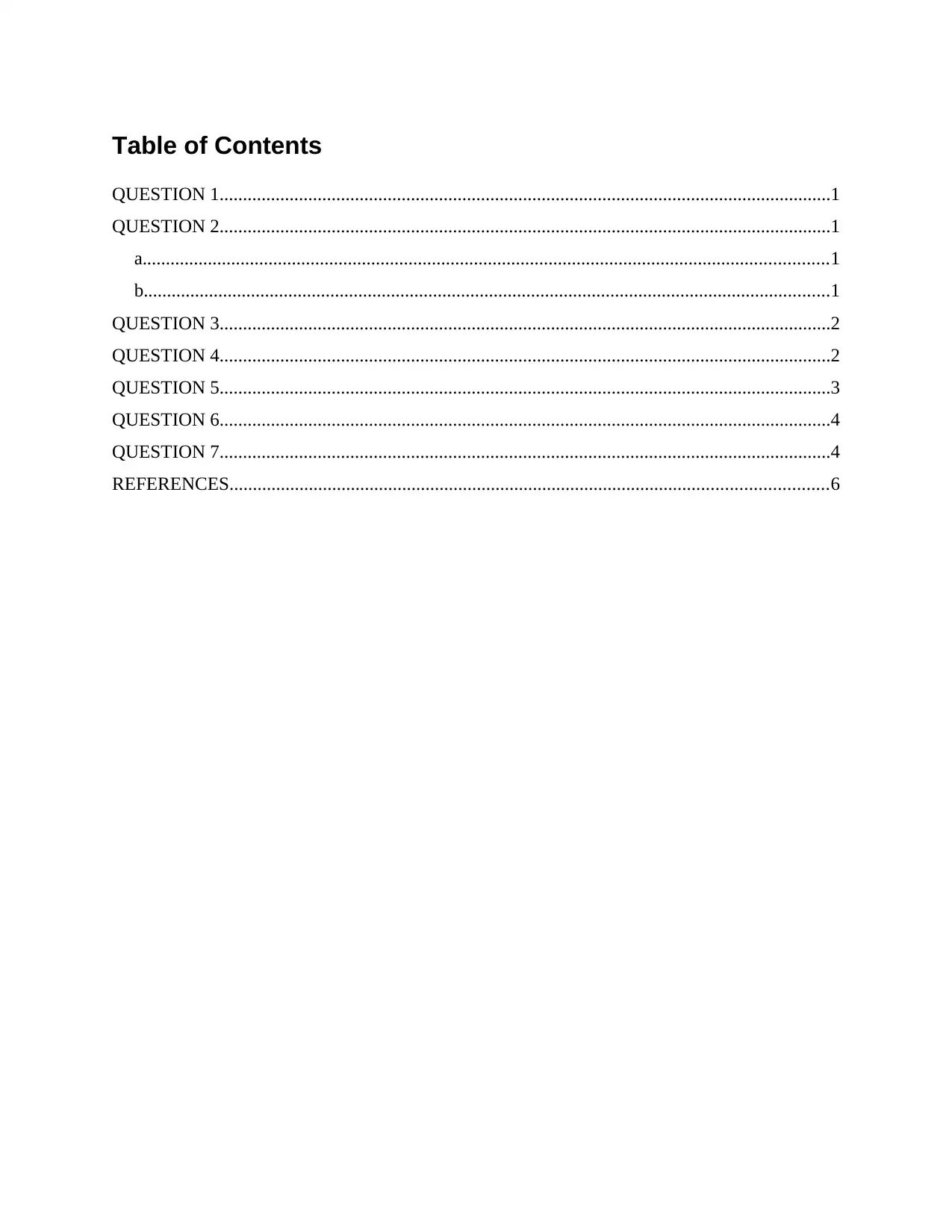
Table of Contents
QUESTION 1...................................................................................................................................1
QUESTION 2...................................................................................................................................1
a...................................................................................................................................................1
b...................................................................................................................................................1
QUESTION 3...................................................................................................................................2
QUESTION 4...................................................................................................................................2
QUESTION 5...................................................................................................................................3
QUESTION 6...................................................................................................................................4
QUESTION 7...................................................................................................................................4
REFERENCES................................................................................................................................6
QUESTION 1...................................................................................................................................1
QUESTION 2...................................................................................................................................1
a...................................................................................................................................................1
b...................................................................................................................................................1
QUESTION 3...................................................................................................................................2
QUESTION 4...................................................................................................................................2
QUESTION 5...................................................................................................................................3
QUESTION 6...................................................................................................................................4
QUESTION 7...................................................................................................................................4
REFERENCES................................................................................................................................6
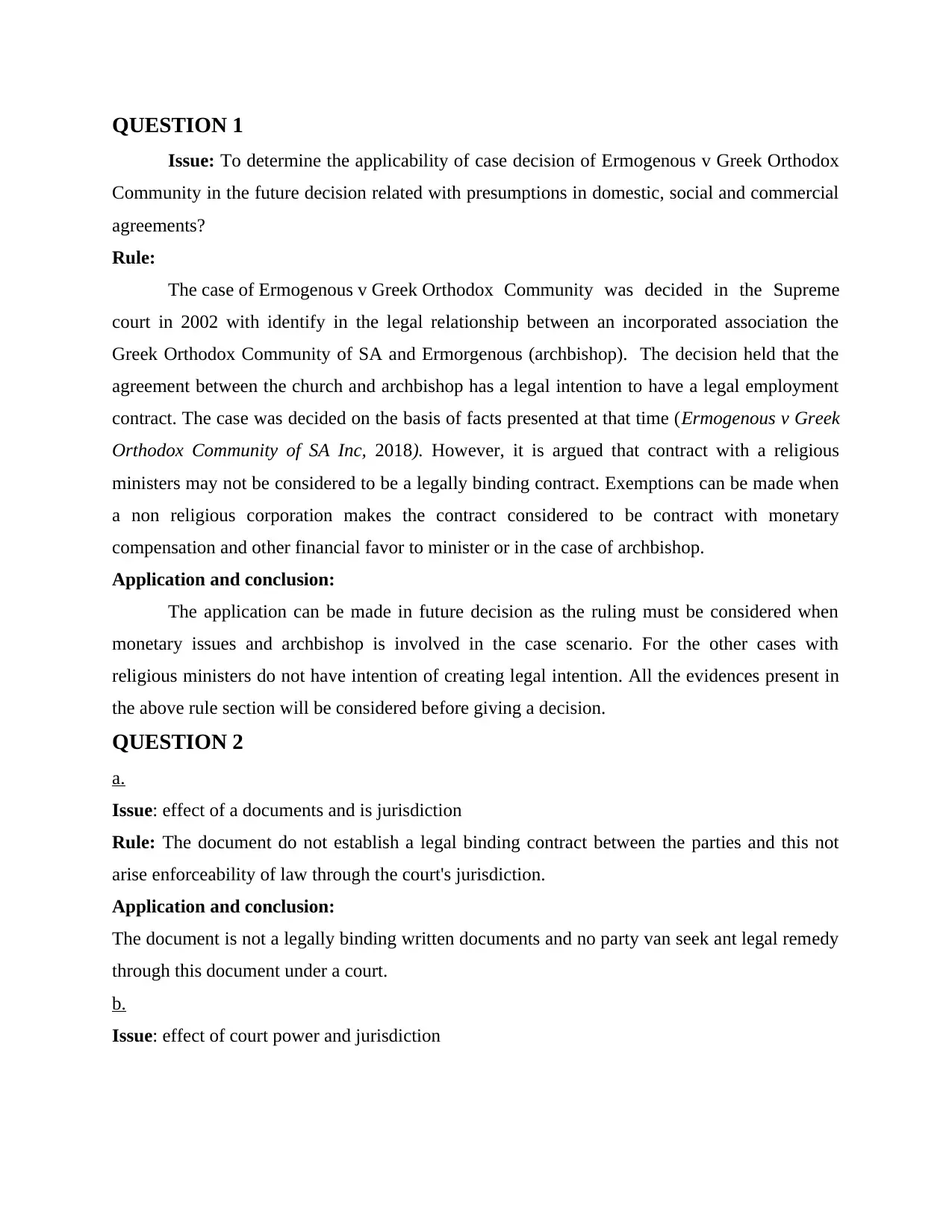
QUESTION 1
Issue: To determine the applicability of case decision of Ermogenous v Greek Orthodox
Community in the future decision related with presumptions in domestic, social and commercial
agreements?
Rule:
The case of Ermogenous v Greek Orthodox Community was decided in the Supreme
court in 2002 with identify in the legal relationship between an incorporated association the
Greek Orthodox Community of SA and Ermorgenous (archbishop). The decision held that the
agreement between the church and archbishop has a legal intention to have a legal employment
contract. The case was decided on the basis of facts presented at that time (Ermogenous v Greek
Orthodox Community of SA Inc, 2018). However, it is argued that contract with a religious
ministers may not be considered to be a legally binding contract. Exemptions can be made when
a non religious corporation makes the contract considered to be contract with monetary
compensation and other financial favor to minister or in the case of archbishop.
Application and conclusion:
The application can be made in future decision as the ruling must be considered when
monetary issues and archbishop is involved in the case scenario. For the other cases with
religious ministers do not have intention of creating legal intention. All the evidences present in
the above rule section will be considered before giving a decision.
QUESTION 2
a.
Issue: effect of a documents and is jurisdiction
Rule: The document do not establish a legal binding contract between the parties and this not
arise enforceability of law through the court's jurisdiction.
Application and conclusion:
The document is not a legally binding written documents and no party van seek ant legal remedy
through this document under a court.
b.
Issue: effect of court power and jurisdiction
Issue: To determine the applicability of case decision of Ermogenous v Greek Orthodox
Community in the future decision related with presumptions in domestic, social and commercial
agreements?
Rule:
The case of Ermogenous v Greek Orthodox Community was decided in the Supreme
court in 2002 with identify in the legal relationship between an incorporated association the
Greek Orthodox Community of SA and Ermorgenous (archbishop). The decision held that the
agreement between the church and archbishop has a legal intention to have a legal employment
contract. The case was decided on the basis of facts presented at that time (Ermogenous v Greek
Orthodox Community of SA Inc, 2018). However, it is argued that contract with a religious
ministers may not be considered to be a legally binding contract. Exemptions can be made when
a non religious corporation makes the contract considered to be contract with monetary
compensation and other financial favor to minister or in the case of archbishop.
Application and conclusion:
The application can be made in future decision as the ruling must be considered when
monetary issues and archbishop is involved in the case scenario. For the other cases with
religious ministers do not have intention of creating legal intention. All the evidences present in
the above rule section will be considered before giving a decision.
QUESTION 2
a.
Issue: effect of a documents and is jurisdiction
Rule: The document do not establish a legal binding contract between the parties and this not
arise enforceability of law through the court's jurisdiction.
Application and conclusion:
The document is not a legally binding written documents and no party van seek ant legal remedy
through this document under a court.
b.
Issue: effect of court power and jurisdiction
⊘ This is a preview!⊘
Do you want full access?
Subscribe today to unlock all pages.

Trusted by 1+ million students worldwide
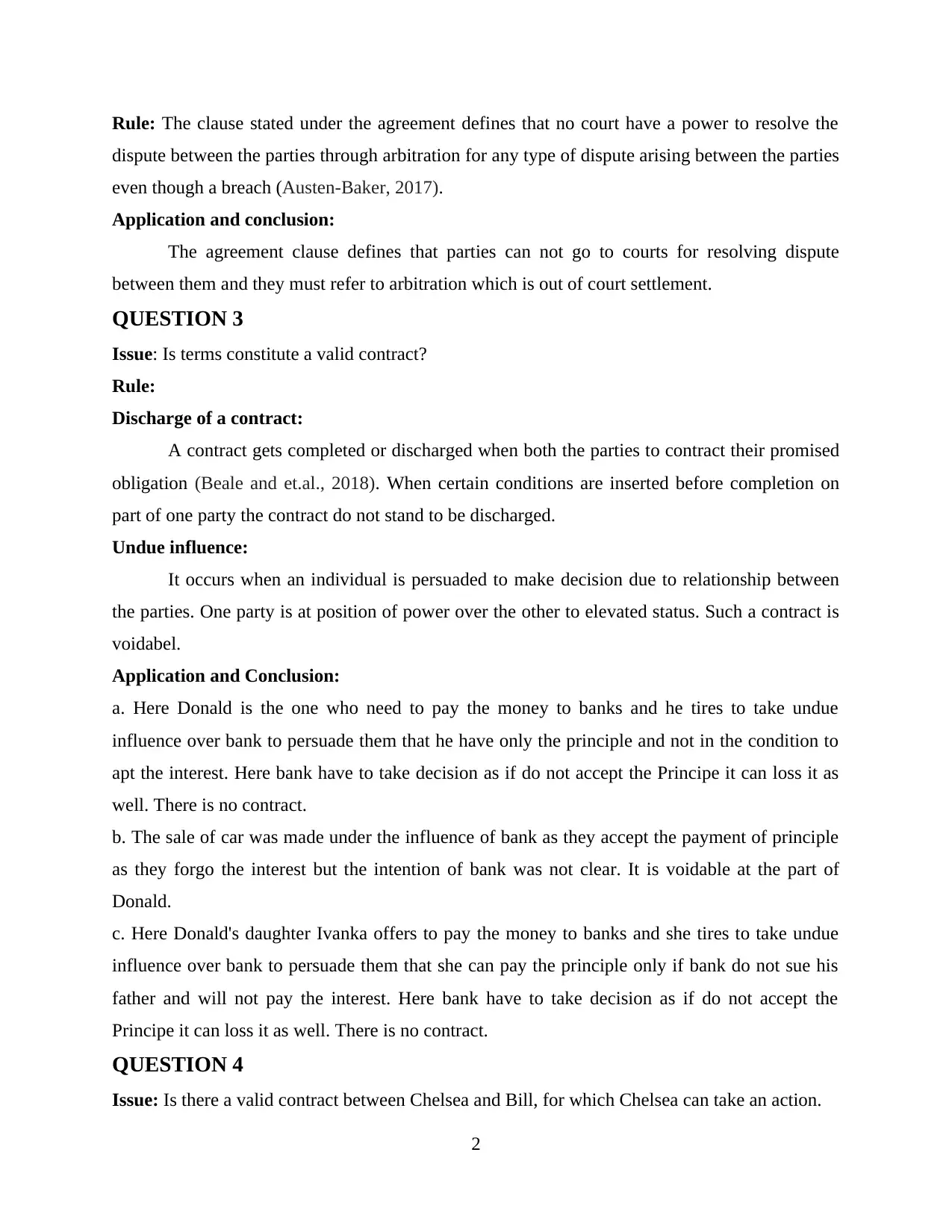
Rule: The clause stated under the agreement defines that no court have a power to resolve the
dispute between the parties through arbitration for any type of dispute arising between the parties
even though a breach (Austen-Baker, 2017).
Application and conclusion:
The agreement clause defines that parties can not go to courts for resolving dispute
between them and they must refer to arbitration which is out of court settlement.
QUESTION 3
Issue: Is terms constitute a valid contract?
Rule:
Discharge of a contract:
A contract gets completed or discharged when both the parties to contract their promised
obligation (Beale and et.al., 2018). When certain conditions are inserted before completion on
part of one party the contract do not stand to be discharged.
Undue influence:
It occurs when an individual is persuaded to make decision due to relationship between
the parties. One party is at position of power over the other to elevated status. Such a contract is
voidabel.
Application and Conclusion:
a. Here Donald is the one who need to pay the money to banks and he tires to take undue
influence over bank to persuade them that he have only the principle and not in the condition to
apt the interest. Here bank have to take decision as if do not accept the Principe it can loss it as
well. There is no contract.
b. The sale of car was made under the influence of bank as they accept the payment of principle
as they forgo the interest but the intention of bank was not clear. It is voidable at the part of
Donald.
c. Here Donald's daughter Ivanka offers to pay the money to banks and she tires to take undue
influence over bank to persuade them that she can pay the principle only if bank do not sue his
father and will not pay the interest. Here bank have to take decision as if do not accept the
Principe it can loss it as well. There is no contract.
QUESTION 4
Issue: Is there a valid contract between Chelsea and Bill, for which Chelsea can take an action.
2
dispute between the parties through arbitration for any type of dispute arising between the parties
even though a breach (Austen-Baker, 2017).
Application and conclusion:
The agreement clause defines that parties can not go to courts for resolving dispute
between them and they must refer to arbitration which is out of court settlement.
QUESTION 3
Issue: Is terms constitute a valid contract?
Rule:
Discharge of a contract:
A contract gets completed or discharged when both the parties to contract their promised
obligation (Beale and et.al., 2018). When certain conditions are inserted before completion on
part of one party the contract do not stand to be discharged.
Undue influence:
It occurs when an individual is persuaded to make decision due to relationship between
the parties. One party is at position of power over the other to elevated status. Such a contract is
voidabel.
Application and Conclusion:
a. Here Donald is the one who need to pay the money to banks and he tires to take undue
influence over bank to persuade them that he have only the principle and not in the condition to
apt the interest. Here bank have to take decision as if do not accept the Principe it can loss it as
well. There is no contract.
b. The sale of car was made under the influence of bank as they accept the payment of principle
as they forgo the interest but the intention of bank was not clear. It is voidable at the part of
Donald.
c. Here Donald's daughter Ivanka offers to pay the money to banks and she tires to take undue
influence over bank to persuade them that she can pay the principle only if bank do not sue his
father and will not pay the interest. Here bank have to take decision as if do not accept the
Principe it can loss it as well. There is no contract.
QUESTION 4
Issue: Is there a valid contract between Chelsea and Bill, for which Chelsea can take an action.
2
Paraphrase This Document
Need a fresh take? Get an instant paraphrase of this document with our AI Paraphraser
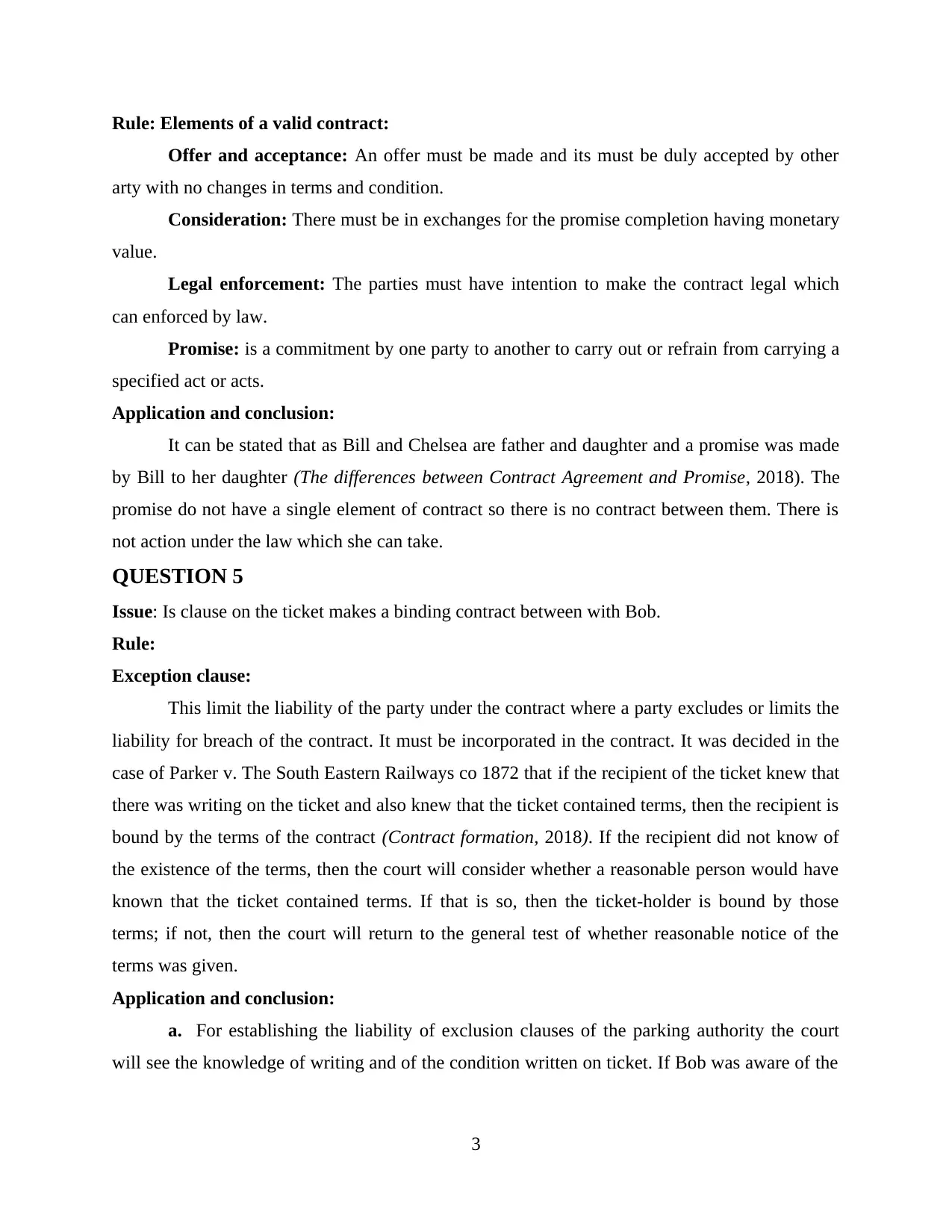
Rule: Elements of a valid contract:
Offer and acceptance: An offer must be made and its must be duly accepted by other
arty with no changes in terms and condition.
Consideration: There must be in exchanges for the promise completion having monetary
value.
Legal enforcement: The parties must have intention to make the contract legal which
can enforced by law.
Promise: is a commitment by one party to another to carry out or refrain from carrying a
specified act or acts.
Application and conclusion:
It can be stated that as Bill and Chelsea are father and daughter and a promise was made
by Bill to her daughter (The differences between Contract Agreement and Promise, 2018). The
promise do not have a single element of contract so there is no contract between them. There is
not action under the law which she can take.
QUESTION 5
Issue: Is clause on the ticket makes a binding contract between with Bob.
Rule:
Exception clause:
This limit the liability of the party under the contract where a party excludes or limits the
liability for breach of the contract. It must be incorporated in the contract. It was decided in the
case of Parker v. The South Eastern Railways co 1872 that if the recipient of the ticket knew that
there was writing on the ticket and also knew that the ticket contained terms, then the recipient is
bound by the terms of the contract (Contract formation, 2018). If the recipient did not know of
the existence of the terms, then the court will consider whether a reasonable person would have
known that the ticket contained terms. If that is so, then the ticket-holder is bound by those
terms; if not, then the court will return to the general test of whether reasonable notice of the
terms was given.
Application and conclusion:
a. For establishing the liability of exclusion clauses of the parking authority the court
will see the knowledge of writing and of the condition written on ticket. If Bob was aware of the
3
Offer and acceptance: An offer must be made and its must be duly accepted by other
arty with no changes in terms and condition.
Consideration: There must be in exchanges for the promise completion having monetary
value.
Legal enforcement: The parties must have intention to make the contract legal which
can enforced by law.
Promise: is a commitment by one party to another to carry out or refrain from carrying a
specified act or acts.
Application and conclusion:
It can be stated that as Bill and Chelsea are father and daughter and a promise was made
by Bill to her daughter (The differences between Contract Agreement and Promise, 2018). The
promise do not have a single element of contract so there is no contract between them. There is
not action under the law which she can take.
QUESTION 5
Issue: Is clause on the ticket makes a binding contract between with Bob.
Rule:
Exception clause:
This limit the liability of the party under the contract where a party excludes or limits the
liability for breach of the contract. It must be incorporated in the contract. It was decided in the
case of Parker v. The South Eastern Railways co 1872 that if the recipient of the ticket knew that
there was writing on the ticket and also knew that the ticket contained terms, then the recipient is
bound by the terms of the contract (Contract formation, 2018). If the recipient did not know of
the existence of the terms, then the court will consider whether a reasonable person would have
known that the ticket contained terms. If that is so, then the ticket-holder is bound by those
terms; if not, then the court will return to the general test of whether reasonable notice of the
terms was given.
Application and conclusion:
a. For establishing the liability of exclusion clauses of the parking authority the court
will see the knowledge of writing and of the condition written on ticket. If Bob was aware of the
3
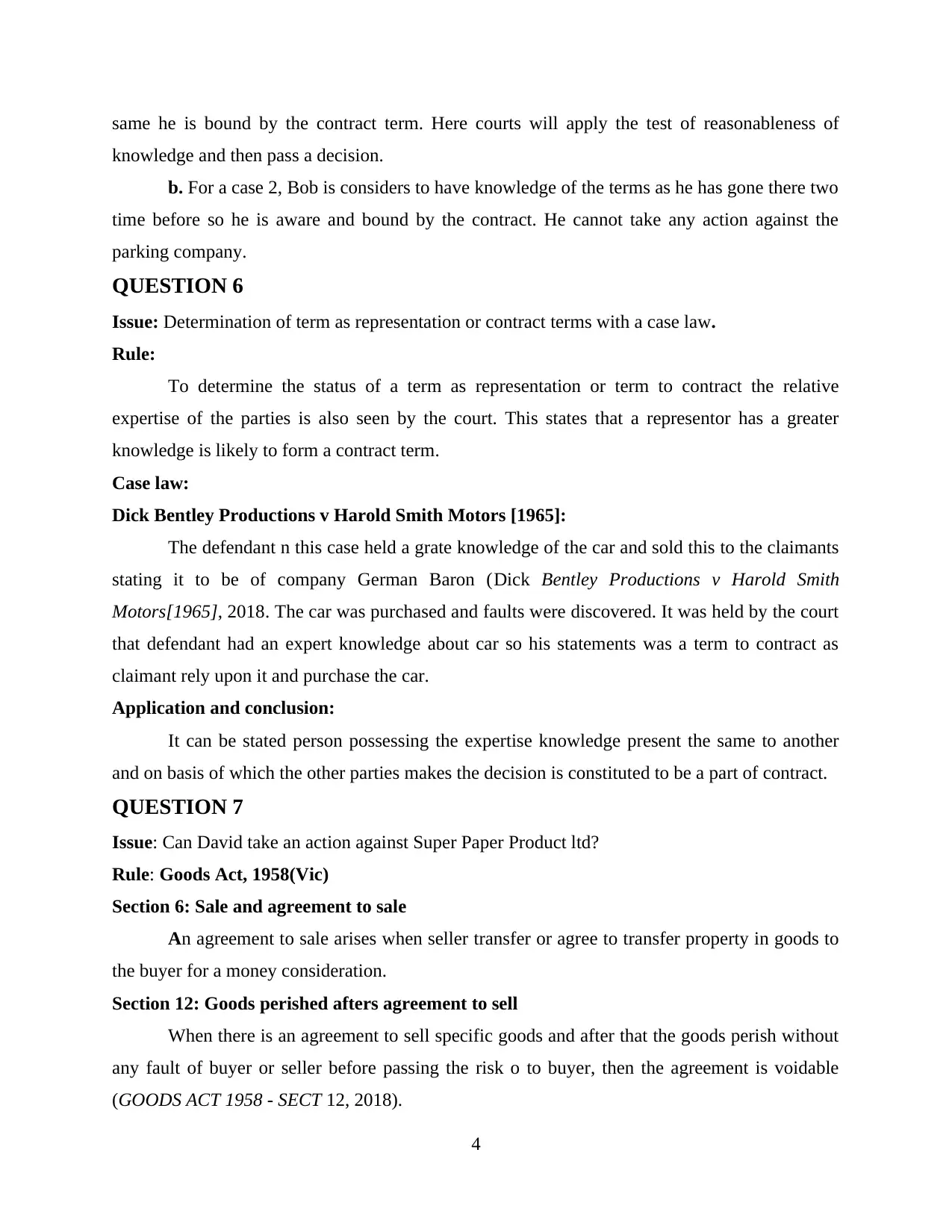
same he is bound by the contract term. Here courts will apply the test of reasonableness of
knowledge and then pass a decision.
b. For a case 2, Bob is considers to have knowledge of the terms as he has gone there two
time before so he is aware and bound by the contract. He cannot take any action against the
parking company.
QUESTION 6
Issue: Determination of term as representation or contract terms with a case law.
Rule:
To determine the status of a term as representation or term to contract the relative
expertise of the parties is also seen by the court. This states that a representor has a greater
knowledge is likely to form a contract term.
Case law:
Dick Bentley Productions v Harold Smith Motors [1965]:
The defendant n this case held a grate knowledge of the car and sold this to the claimants
stating it to be of company German Baron (Dick Bentley Productions v Harold Smith
Motors[1965], 2018. The car was purchased and faults were discovered. It was held by the court
that defendant had an expert knowledge about car so his statements was a term to contract as
claimant rely upon it and purchase the car.
Application and conclusion:
It can be stated person possessing the expertise knowledge present the same to another
and on basis of which the other parties makes the decision is constituted to be a part of contract.
QUESTION 7
Issue: Can David take an action against Super Paper Product ltd?
Rule: Goods Act, 1958(Vic)
Section 6: Sale and agreement to sale
An agreement to sale arises when seller transfer or agree to transfer property in goods to
the buyer for a money consideration.
Section 12: Goods perished afters agreement to sell
When there is an agreement to sell specific goods and after that the goods perish without
any fault of buyer or seller before passing the risk o to buyer, then the agreement is voidable
(GOODS ACT 1958 - SECT 12, 2018).
4
knowledge and then pass a decision.
b. For a case 2, Bob is considers to have knowledge of the terms as he has gone there two
time before so he is aware and bound by the contract. He cannot take any action against the
parking company.
QUESTION 6
Issue: Determination of term as representation or contract terms with a case law.
Rule:
To determine the status of a term as representation or term to contract the relative
expertise of the parties is also seen by the court. This states that a representor has a greater
knowledge is likely to form a contract term.
Case law:
Dick Bentley Productions v Harold Smith Motors [1965]:
The defendant n this case held a grate knowledge of the car and sold this to the claimants
stating it to be of company German Baron (Dick Bentley Productions v Harold Smith
Motors[1965], 2018. The car was purchased and faults were discovered. It was held by the court
that defendant had an expert knowledge about car so his statements was a term to contract as
claimant rely upon it and purchase the car.
Application and conclusion:
It can be stated person possessing the expertise knowledge present the same to another
and on basis of which the other parties makes the decision is constituted to be a part of contract.
QUESTION 7
Issue: Can David take an action against Super Paper Product ltd?
Rule: Goods Act, 1958(Vic)
Section 6: Sale and agreement to sale
An agreement to sale arises when seller transfer or agree to transfer property in goods to
the buyer for a money consideration.
Section 12: Goods perished afters agreement to sell
When there is an agreement to sell specific goods and after that the goods perish without
any fault of buyer or seller before passing the risk o to buyer, then the agreement is voidable
(GOODS ACT 1958 - SECT 12, 2018).
4
⊘ This is a preview!⊘
Do you want full access?
Subscribe today to unlock all pages.

Trusted by 1+ million students worldwide

Application and conclusion:
This can be sated a there was sale agreements of selling gift wrapping paper between
David and the company. For with property in goods and risk was duly transferred to the buyers
that is David. He bought wrapping papers at the price of printing paper so there is no action
which he can take against company as he used the parts other than its specified use.
5
This can be sated a there was sale agreements of selling gift wrapping paper between
David and the company. For with property in goods and risk was duly transferred to the buyers
that is David. He bought wrapping papers at the price of printing paper so there is no action
which he can take against company as he used the parts other than its specified use.
5
Paraphrase This Document
Need a fresh take? Get an instant paraphrase of this document with our AI Paraphraser
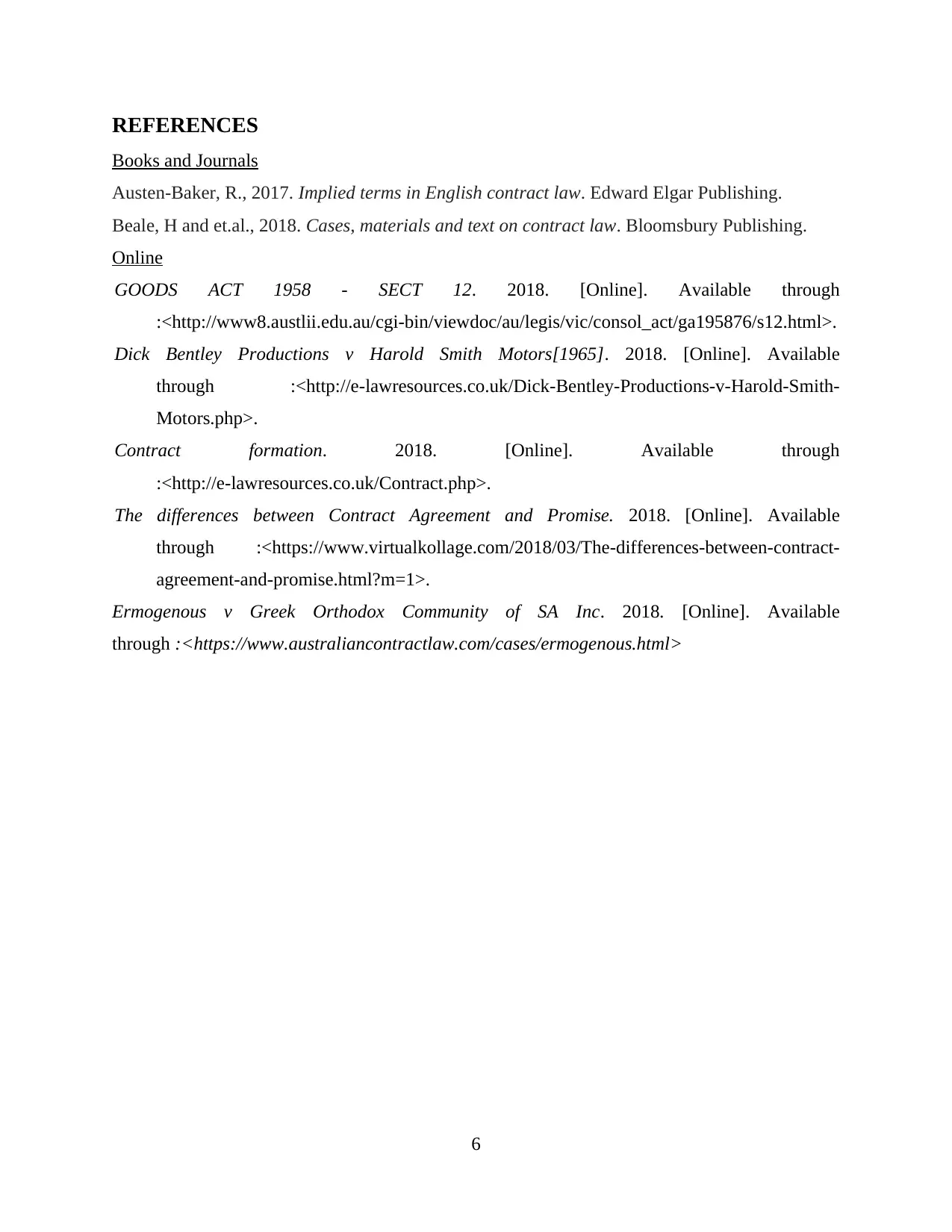
REFERENCES
Books and Journals
Austen-Baker, R., 2017. Implied terms in English contract law. Edward Elgar Publishing.
Beale, H and et.al., 2018. Cases, materials and text on contract law. Bloomsbury Publishing.
Online
GOODS ACT 1958 - SECT 12. 2018. [Online]. Available through
:<http://www8.austlii.edu.au/cgi-bin/viewdoc/au/legis/vic/consol_act/ga195876/s12.html>.
Dick Bentley Productions v Harold Smith Motors[1965]. 2018. [Online]. Available
through :<http://e-lawresources.co.uk/Dick-Bentley-Productions-v-Harold-Smith-
Motors.php>.
Contract formation. 2018. [Online]. Available through
:<http://e-lawresources.co.uk/Contract.php>.
The differences between Contract Agreement and Promise. 2018. [Online]. Available
through :<https://www.virtualkollage.com/2018/03/The-differences-between-contract-
agreement-and-promise.html?m=1>.
Ermogenous v Greek Orthodox Community of SA Inc. 2018. [Online]. Available
through :<https://www.australiancontractlaw.com/cases/ermogenous.html>
6
Books and Journals
Austen-Baker, R., 2017. Implied terms in English contract law. Edward Elgar Publishing.
Beale, H and et.al., 2018. Cases, materials and text on contract law. Bloomsbury Publishing.
Online
GOODS ACT 1958 - SECT 12. 2018. [Online]. Available through
:<http://www8.austlii.edu.au/cgi-bin/viewdoc/au/legis/vic/consol_act/ga195876/s12.html>.
Dick Bentley Productions v Harold Smith Motors[1965]. 2018. [Online]. Available
through :<http://e-lawresources.co.uk/Dick-Bentley-Productions-v-Harold-Smith-
Motors.php>.
Contract formation. 2018. [Online]. Available through
:<http://e-lawresources.co.uk/Contract.php>.
The differences between Contract Agreement and Promise. 2018. [Online]. Available
through :<https://www.virtualkollage.com/2018/03/The-differences-between-contract-
agreement-and-promise.html?m=1>.
Ermogenous v Greek Orthodox Community of SA Inc. 2018. [Online]. Available
through :<https://www.australiancontractlaw.com/cases/ermogenous.html>
6
1 out of 8
Related Documents
Your All-in-One AI-Powered Toolkit for Academic Success.
+13062052269
info@desklib.com
Available 24*7 on WhatsApp / Email
![[object Object]](/_next/static/media/star-bottom.7253800d.svg)
Unlock your academic potential
Copyright © 2020–2026 A2Z Services. All Rights Reserved. Developed and managed by ZUCOL.



